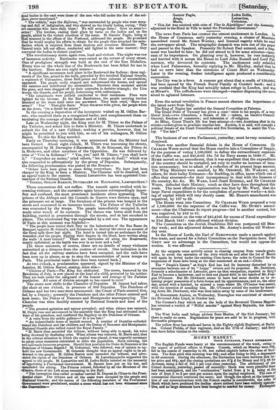The business of our own Parliament, yesterday, must be very
summarily dismissed.
There was another financial debate in the House of Commons. Sir CHARLES Woo]) moved that the House resolve into a Committee of Supply, for the purpose of voting 1,100,0001. to defray the extraordinary expenses of the Caffre war, and 245,4101. 19s. 7d. for Navy excess in 1846-7. Mr. HUME moved as an amendment, that it was expedient that the expenditure of the country should be curtailed, not only to render an increase of taxa- tion unnecessary, but to admit of a reduction of its present large amount. The Whig Ministers were assailed, by Mr. OSBORNE, Mr. WAKLEY, and others, for their bulky Estimates—for doubling, in office, taxes which out of office they execrated—for their incompetency to deal with the finances of the country, &c. &c. Mr. WARD, Lord Jotter RUSSELL, and Sir CHARLES WOOD, defended their Ministry, much as they have done throughout this week. The most effective representation was that by Mr. Ward, that the large Naval expenditure is for the completion of permanent works—a sink- ing of capital which will very shortly cease. Mr. Hume's amendment was negatived, by 157 to 59. The House went into Committee. Sir CHARLES WOOD proposed a vote of 1,100,0001. for the expenses of the Caffre war. Mr. Ilumo's amend- ment—that the Chairman do report progress—led to another contest, but was negatived, by 252 to 61.
Another contest on the vote of 245,4101. for excess of Naval expenditure to 31st March 1847: vote affirmed without division.
The Committee on the Jewish Disabilities Bill was postponed till Mon- day week; and the adjourned debate on Mr. Anstey's motion till Wednes- day next.
In the House of Lords, the Earl of HARDWICKE made a speech against free trade, and moved for a Select Committee on the Navigation-laws. Earl GREY saw no advantage in the Committee, but would not oppose the motion. It was affirmed.


























 Previous page
Previous page